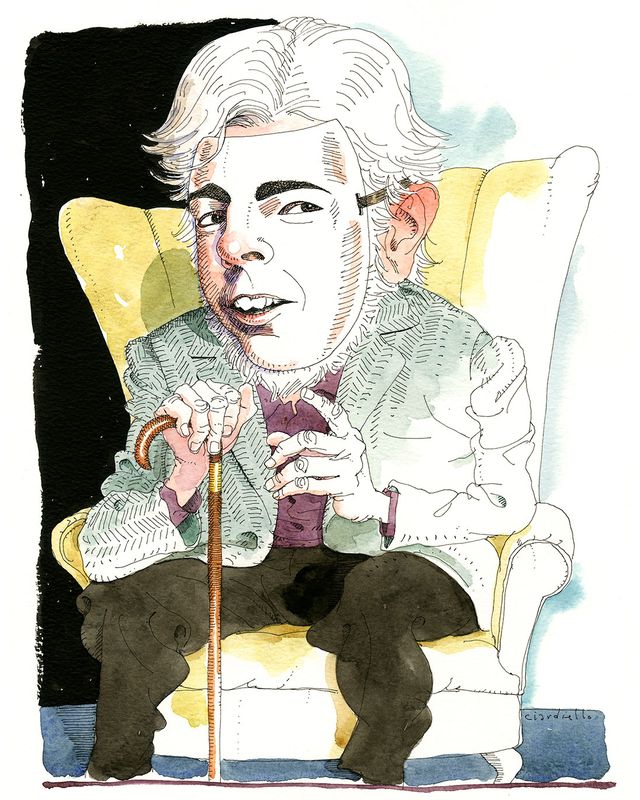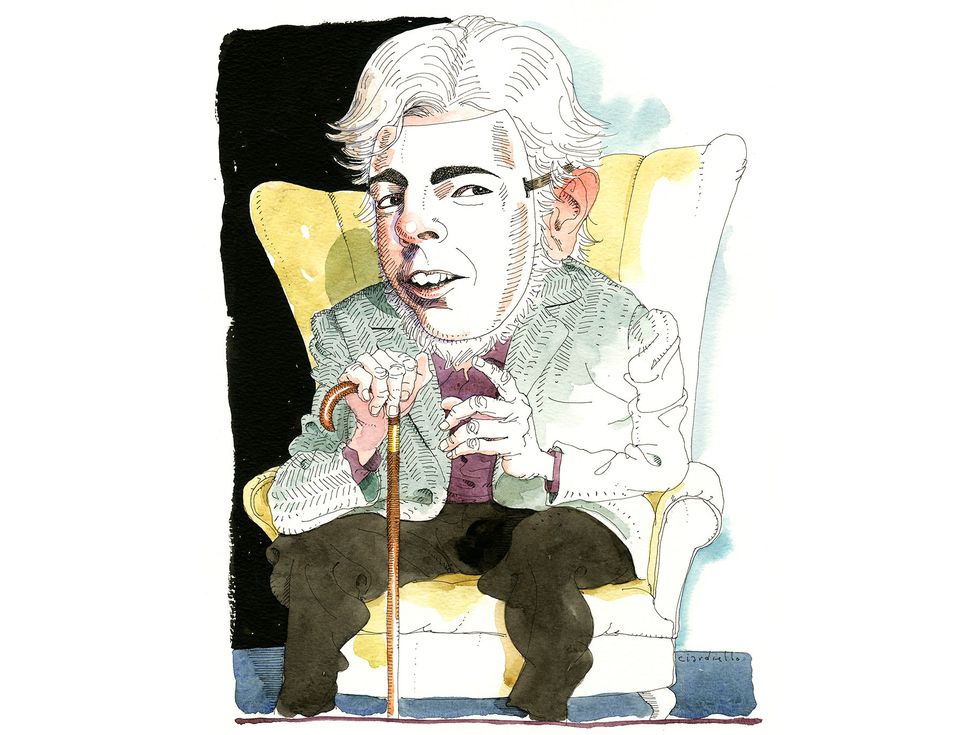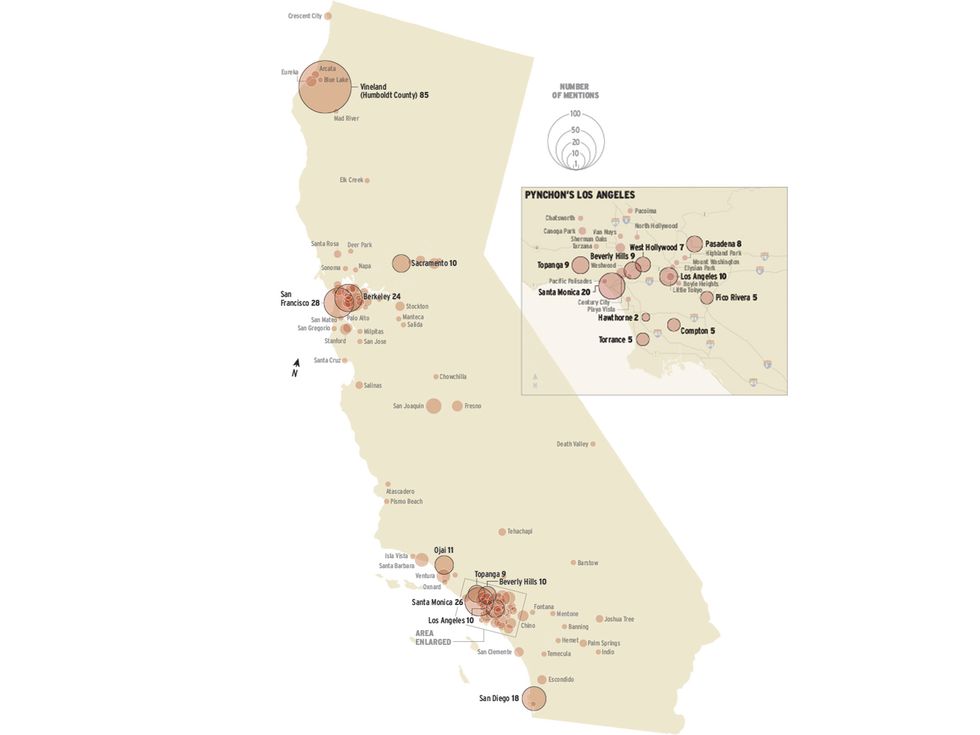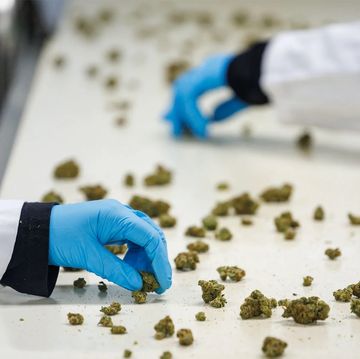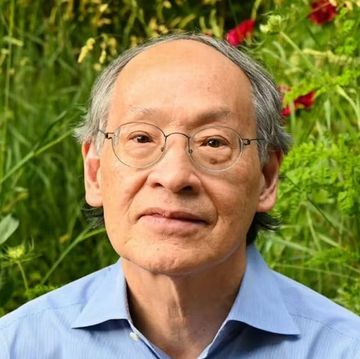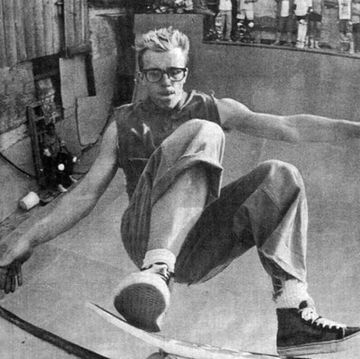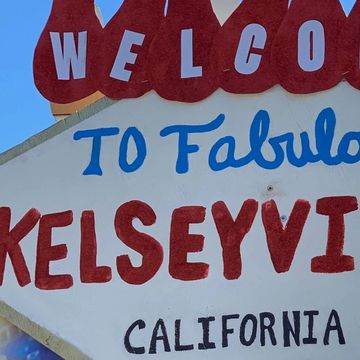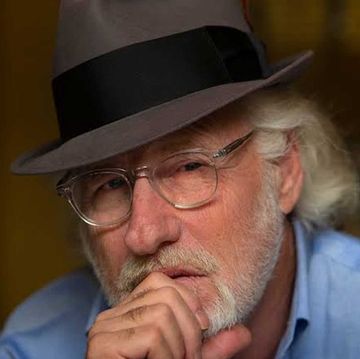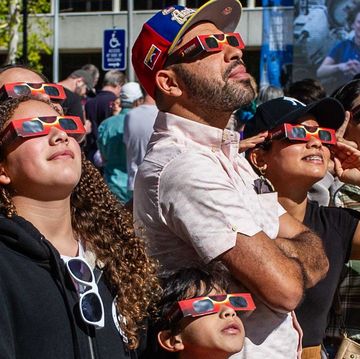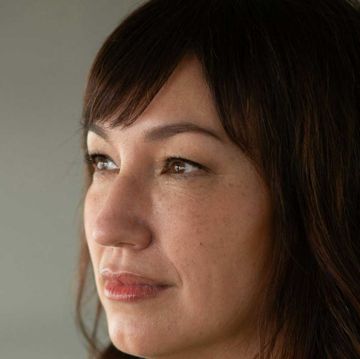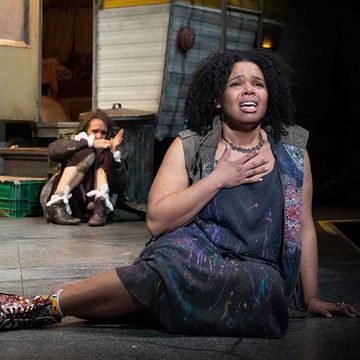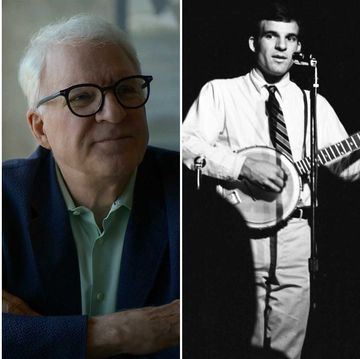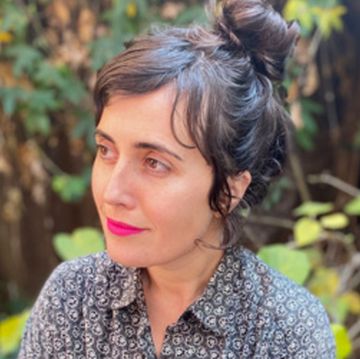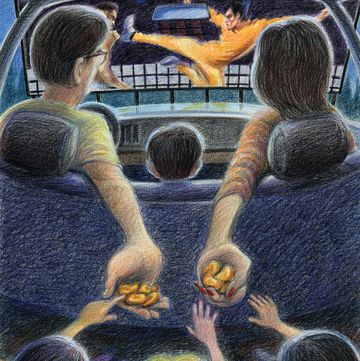Thomas Pynchon has never, ever granted an interview. This titanically talented writer guards his privacy like a flight risk. The National Enquirer recently stalked Pynchon for six months before stealing a photograph of him as he voted at his local polling place, which, to some of us, was like shooting a GI in the act of raising the American flag. Pynchon’s stance is that of every private writer: let the books speak for themselves.
The following Q&A takes very literally this reticent author’s plea. Here is the story of Pynchon’s life and work, with a particular focus on California, as told via his nine books. His answers are his own words, taken verbatim, one book at a time, from V. up through Bleeding Edge. A fine writer and his characters may think they’re discussing other things, but it’s my contention that every author’s keyboard is a polygraph. Pynchon—funny, prophetic, menschy, Californian to his fingerprints—writes his autobiography with every line.
This article was featured in Alta Journal's free Weekend Read newsletter.
SUBSCRIBE
First the facts: Thomas Ruggles Pynchon Jr. was born on May 8, 1937, in the Long Island, New York, city of Glen Cove. He entered Cornell as an engineering physics major, then turned a page in the course catalog and found a second home in the English Department. After graduation, he worked in Seattle as a technical writer for Boeing and spent time in, among other places, Mexico City and Guanajuato. Somewhere in there, he wrote one of the best American first novels of the past century, 1963’s V., where we begin.
DAVID KIPEN: Where should we look first to understand you?
THOMAS PYNCHON: To the west coast.
KIPEN: But you’re a Yankee whose ancestors came over on the Mayflower! How would you describe your childhood impression of California before you ever visited?
PYNCHON: Happy with westerns and detective stories.
KIPEN: And how did your upbringing among traditional suburban families shape you? What do you remember most about Long Island?
PYNCHON: The torso of the father solid and sure in its J. Press suit; the eyes of the daughters secret behind sunglasses rimmed in rhinestones…. Who could escape? Who could want to?
KIPEN: Escape to where? What did you want to know about instead?
PYNCHON: How the road is.… What it’s like west of Ithaca and south of Princeton.
KIPEN: You sure found out. You wound up in Manhattan Beach, writing that L.A.-based mainstay of the Intro to Modern Fiction syllabus, The Crying of Lot 49. Tell me, what did living so close to the Pacific offer you?
PYNCHON: A real alternative to the exitlessness, the absence of surprise to life, that harrows the head of everybody American you know, and you too, sweetie.
KIPEN: You once wrote that Lot 49 was a story “marketed as a ‘novel’…in which I seem to have forgotten most of what I thought I’d learned up till then.” How can you say that? The book means so much to so many of us. Do you stand by that? Or have you had—?
PYNCHON: Yeah…second thoughts.
KIPEN: I understand if you think too many people turn first to Lot 49 just because it’s short. But still, the beauty of the text—
PYNCHON: Why…is everybody so interested in texts?… You guys, you’re like Puritans are about the Bible. So hung up with words, words.… The reality is in this head. Mine. I’m the projector at the planetarium.
KIPEN: Spent time at the Griffith Observatory, have you? By the way, your fondness in Lot 49 for the Raymond Chandler tradition really comes across. Do you still take an interest in L.A. writing? I hope you don’t mind if I recommend a terrific new book on the subject? I happen to have a copy here.
PYNCHON: Your book?
KIPEN: I’d be happy to sign—
PYNCHON: Real good documentation, this Californiana crap.
KIPEN: But I quoted you twice in it! You’re so quotable, I’m surprised nobody else has thought to stitch together an interview like this one.
PYNCHON: Our lawyer will read it.
KIPEN: Hmm. After Lot 49, you holed up and wrote what most people, a little hastily, consider your masterpiece: Gravity’s Rainbow. What was a typical working day like for you in L.A. back then? You wake up. What’s the first thing down there south of the airport that you hear in the morning?
PYNCHON: A screaming comes across the sky.
KIPEN: But that’s…you mean the most famous first line in modern literature came to you from living near the flight path at LAX?
PYNCHON: Now—
KIPEN: You also made room for other California outrages in the book, like the anti-Chicano Zoot Suit Riots of 1943. For all its darkness, there must be something about L.A. and its mythologies that you miss?
PYNCHON: The lacework balconies of the Bradbury Building…
KIPEN: The year 2023 will mark the 50th anniversary of Gravity’s Rainbow’s publication. Shouldn’t there be some sort of local observance of this milestone?
PYNCHON: A conference or some shit?
KIPEN: See if we invite you. Did you ever imagine the book would become such a classic? If not, what did you think the next half century might hold for the world?
PYNCHON: A giant cartel including winners and losers both, in an amiable agreement to share what is there to be shared… They can pick us off out there one by one.
KIPEN: Who would’ve been behind it?
PYNCHON: A zany (or, if you enjoy paranoid systems, a horribly rational) Midland, Texas oil man.
KIPEN: You mean the Bush family? Where would such a cartel have laundered its money?
PYNCHON: All the oil money taken…by the Nobels has gone into Nobel Prizes.
KIPEN: The Nobels? Shhh, keep it down. You might blow your chance at the prize by baiting them. Why risk it? What are they and all these other industrialists so guilty of?
PYNCHON: Taking and not giving back.… The System removing from the rest of the World these vast quantities of energy to keep its own tiny desperate fraction showing a profit.
KIPEN: Speaking of energy, where did yours go after Rainbow? All you published during the next 17 years was a collection of five youthful short stories, Slow Learner. It included “The Secret Integration”—the best possible place for Pynchon rookies to begin, a practically perfect story about racism and imagination—plus a charming, surprisingly autobiographical introduction. Why did you finally decide to give readers a glimpse of the life behind the literature?
PYNCHON: Somewhere I had come up with the notion that one’s personal life had nothing to do with fiction, when the truth, as everyone knows, is nearly the direct opposite.
KIPEN: So you admit that a bit of biography can sometimes shed useful light on a writer’s work? Not prurient questions about what’s in your fridge, or even on your bookshelves—more the human mystery of how who you are factors into what you do.
PYNCHON: [Silence.]
KIPEN: Ho-kay… What advice would you have for budding novelists today—young or otherwise, on campus or off?
PYNCHON: Shut up and listen to the American voices.… The ’60s was…limited by the failure of college kids and blue-collar workers to get together politically…real, invisible class force fields in the way of communication between the two groups.
KIPEN: Boy, I hope we never see that again. You revisited the counterculture in your first novel in almost two decades, Vineland, from 1990—one of very few novels to capture both Northern and Southern California between their covers. Where had you been all those years?
PYNCHON: Humboldt County.… Beautiful country, only a short spin up or down 101 from everything.… You can hide, all right.
KIPEN: The female characters in Vineland somehow seem even deeper and more dimensional than those in your earlier writings. What happened there?
PYNCHON: Es posible, / Increíble, / It’s love…
KIPEN: Ah yes, in 1990 you married your girlfriend—who I gather is also your agent—and you had a son together the following year. Congratulations on your 30th anniversary, by the way. And circa Vineland, on the brink of parenthood, what did you suppose the future held for the country?
PYNCHON: Someday, with the right man in the White House, there will be a Department of Jesus, yes and a Secretary of Jesus.… Dismantle the New Deal, reverse the effects of World War II, restore fascism at home and around the world, flee into the past, can’t you feel it, all the dangerous childish stupidity—“I don’t like the way it came out, I want it to be my way.”
KIPEN: Glad we dodged that bullet.
PYNCHON: [Weeping bitterly.]
KIPEN: Around the time you published Vineland, you moved home to New York and completed Mason & Dixon, about the two 18th-century British surveyors who drew the border between slavery and freedom. One critic called it worthy of “[Pynchon’s] twin obsessions—America and science—but with his anger at the mess that greed has made of them both.” Maybe they left out a third obsession: you’re so passionate about music in your books. Do you listen to music when you write? What kind?
PYNCHON: The very Rhythm of the Engines, the Clamor of the Mills, the Rock of the Oceans, the Roll of the Drums in the Night…Surf Music!
KIPEN: Are you OK? I notice your language is getting a wee bit anachronistic…
PYNCHON: And you too.
KIPEN: You seem like such a mellow guy. Why all the emphasis on conspiracy and paranoia in your books? Why would the ruling class have it in for you?
PYNCHON: Somehow, what I got into printing up, were Accounts of certain Crimes I had observ’d, committed by the Stronger against the Weaker.
KIPEN: And yet the overall tone of Mason & Dixon seems gentler, more forgiving. What happened there?
PYNCHON: What happens to men sometimes…is that one day all at once they’ll understand how much they love their children, as absolutely as a child gives away its own love.… The Miracle of Fatherhood.
KIPEN: After Mason & Dixon, you published your longest, maybe most undervalued novel, 2006’s Against the Day, which one review later called a “still-smoking asteroid, whose otherworldly inner music readers are just beginning to tap back at.” It takes place all over Europe and beyond, but, as with Gravity’s Rainbow, it winds up in Los Angeles. California really got under your skin, didn’t it? When you think of L.A., what do you think of?
PYNCHON: An incalculable expanse of lights…rat-infested pockets of old California money, a relentlessly unacknowledged past.
KIPEN: A lot of Against the Day is as good as anything you’ve written. Why don’t you think it’s gotten its due from readers?
PYNCHON: Lazy sons of bitches.
KIPEN: Well, then, don’t you think critics and scholars have a role to play in elucidating your work for readers who might otherwise be intimidated by it?
PYNCHON: All due respect to the Professor…I don’t know how much of that I can tolerate.
KIPEN: Three years after Against the Day, you came out with Inherent Vice, a detective story that another critic called a “throwaway masterwork,” “a shaggy-dog epic,” an—excuse me, is that a complete, well-thumbed run of Alta magazine there? What’s the subject of your favorite piece so far?
PYNCHON: Musso & Frank’s.
KIPEN: My short story? From last summer’s issue? You liked it?
PYNCHON: A nice piece of…work.
KIPEN: Now that you know a lot more about California than at the beginning of your career, what do you imagine was the fulcrum moment in its history? The industrial boom of World War II? The discovery of gold in 1848?
PYNCHON: The arrival of the Portolá expedition in 1769.… On the face of one of them—maybe Portolá himself? there was an expression of wonder, like, What’s this, what unsuspected paradise? Did God with his finger trace out and bless this perfect little valley, intending it only for us?
KIPEN: That about breaks my heart. And what’s your most vivid personal memory of L.A.?
PYNCHON: One night…in Westwood…a little girl…breathless with excitement in front of a lighted bookstore window, calling to her mother to come and look. “Books, Mama! Books!”
KIPEN: Hey! Aren’t you supposed to be this incredibly polymathic novelist who should’ve won the Nobel Prize long ago, only his books are too hard for the Swedish Academy to understand? Why, Thomas Pynchon, you’re just an old softy!
PYNCHON: Shh…
KIPEN: If you love California so much, why don’t you just move back here? What are you waiting for?
PYNCHON: A border where nobody could tell anymore in the fog who was Mexican, who was Anglo, who was anybody.
KIPEN: Six years ago, you revisited New York for Bleeding Edge, “a lovably scruffy comedy of remarriage, half-hidden behind the lopsided Groucho mask of Pynchon’s second straight private-eye story,” according to still another critic.
PYNCHON: Who are these people?
KIPEN: Never you mind. So it’s an open secret now that you live…?
PYNCHON: On the Upper West Side.
KIPEN: But what about my thesis? Here I build this airtight case for you as the quintessential California novelist, I practically memorize all your novels, till I can quote you out of context and make you say anything—and then you go and set your most recent novel in Manhattan?
PYNCHON: Empathy, we’re all out of that today, the truck didn’t show up.
KIPEN: You’re, what, 82 now? So what’s life like for you these days?
PYNCHON: We continue to work our ass off.
KIPEN: I knew it! So there’ll be another novel soon?
PYNCHON: Yes. No. I’m good…what?
KIPEN: I understand. You don’t want to jinx it. Give me a heads-up when you can, though? And I see we’re running out of time. You’re forever making up songs in your novels—would you mind if we improvised a little soft-shoe number?
PYNCHON: A duet?
KIPEN: [At a patter-song tempo] Tom, what do you think of the current administration—just between you and me, over a couple of tall ones?
PYNCHON: [In harmony] Donald Trump’s cost accountants…guiding principle…pay the major contractors, blow off the small ones.
KIPEN: Still, deep down, are you a Californian or what?
PYNCHON: I’m wearing California plates on my butt.
KIPEN: That’s more like it [moving in for a hug]!
PYNCHON: [One of those long West Coast shrugs.]
KIPEN: [Arms flung wide] You’re certain?
PYNCHON: [Curtain.]
David Kipen, a former NEA director of literature, teaches at UCLA and is the proprietor of the Libros Schmibros lending library in Los Angeles. His latest book is Dear Los Angeles: The City in Diaries and Letters, 1542 to 2018.
